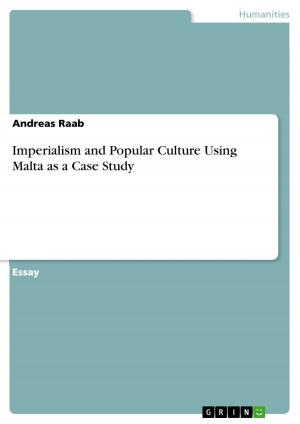Jean Paul Sartre, Albert Camus and Frantz Fanon on the topic of decolonization and the French occupation of Algeria.
Nonfiction, Social & Cultural Studies, Political Science, International, International Relations| Author: | Sophie Duhnkrack | ISBN: | 9783640517442 |
| Publisher: | GRIN Publishing | Publication: | January 25, 2010 |
| Imprint: | GRIN Publishing | Language: | English |
| Author: | Sophie Duhnkrack |
| ISBN: | 9783640517442 |
| Publisher: | GRIN Publishing |
| Publication: | January 25, 2010 |
| Imprint: | GRIN Publishing |
| Language: | English |
Essay from the year 2009 in the subject Politics - International Politics - Region: Near East, Near Orient, grade: 85, Ben Gurion University, language: English, abstract: Jean Paul Sartre, Albert Camus and Frantz Fanon are three well-known intellectuals who extensively dealt with decolonization. All three were involved in a heated debate about the French occupation of Algeria and its development, especially after the outset of the Algerian revolution at the end of 1956. An analysis of their stances on Algeria and on decolonization in general must take into account their differing backgrounds, experiences and schools. Sartre represents the only one of the three who was born in the French motherland. He was a prominent exponent of existentialism which characterizes his approach to decolonization and his writings strongly criticize humanism or its lack of application in the colonies. Albert Camus is an Algerian born writer and philosopher, who in 1964 received the Nobel Prize with the rational that 'his work which, rich in ideas and filled with the spirit of freedom and the quest for truth, has exerted a far-reaching influence on our age.' Following this essay will explore weather his colleagues, Sartre and Fanon, agree with the image depicted by this quote. Like Sartre, Camus as well is called an existentialist- a title which, however, he refuses. Frantz Fanon was born in the French colony of Martinique. His origins had a strong influence on his writings, especially through the Négritude approach, which is a literary and political movement that developed in the 1930s promoting the consciousness of the indigenous black culture as the best instrument for the fight against French colonial racism. The following paper will analyze the three approaches presented by these authors to decolonization, mainly concerning the example of Algeria and its battle for independence. By means of several examples it will illustrate the similar or diverging opinions and attitudes of each one regarding the others.
Essay from the year 2009 in the subject Politics - International Politics - Region: Near East, Near Orient, grade: 85, Ben Gurion University, language: English, abstract: Jean Paul Sartre, Albert Camus and Frantz Fanon are three well-known intellectuals who extensively dealt with decolonization. All three were involved in a heated debate about the French occupation of Algeria and its development, especially after the outset of the Algerian revolution at the end of 1956. An analysis of their stances on Algeria and on decolonization in general must take into account their differing backgrounds, experiences and schools. Sartre represents the only one of the three who was born in the French motherland. He was a prominent exponent of existentialism which characterizes his approach to decolonization and his writings strongly criticize humanism or its lack of application in the colonies. Albert Camus is an Algerian born writer and philosopher, who in 1964 received the Nobel Prize with the rational that 'his work which, rich in ideas and filled with the spirit of freedom and the quest for truth, has exerted a far-reaching influence on our age.' Following this essay will explore weather his colleagues, Sartre and Fanon, agree with the image depicted by this quote. Like Sartre, Camus as well is called an existentialist- a title which, however, he refuses. Frantz Fanon was born in the French colony of Martinique. His origins had a strong influence on his writings, especially through the Négritude approach, which is a literary and political movement that developed in the 1930s promoting the consciousness of the indigenous black culture as the best instrument for the fight against French colonial racism. The following paper will analyze the three approaches presented by these authors to decolonization, mainly concerning the example of Algeria and its battle for independence. By means of several examples it will illustrate the similar or diverging opinions and attitudes of each one regarding the others.















